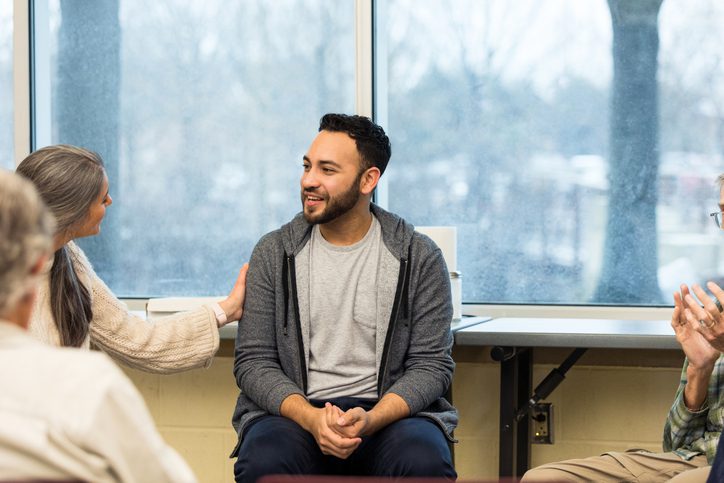Although stress, depression, post-traumatic stress disorder (PTSD), and addiction rates are high for professionals in the military, law enforcement, and emergency response, many Veterans and first responders don’t seek help for drug and alcohol misuse because they’re not confident their unique situations can be addressed in a civilian treatment center. At Great Oaks Recovery Center outside of Houston, our goal is to change that perception—and your health—with the Tactical Recovery program.
Why the Need for Focused, Veteran-Ready Care
Former and current military personnel, as well as police officers and first response teams, don’t hesitate to step up when needed. However, this doesn’t mean that what they experience in the face of danger and emergency situations simply fades away. The medical community now recognizes how the body and mind “keep score” of trauma, as Bessel van der Kolk pointed out in his book, The Body Keeps Score, and related work.
In his research, van der Kolk determined that “people with PTSD experience various symptoms, including personality changes, depression, social disconnection, poor sleep hygiene, flashbacks, and nightmares.” Additionally, when individuals face “recurrent episodes of disturbing symptoms, PTSD patients are prone to develop risky behaviors, including alcoholism, substance abuse, or self-injury.”
According to the U.S. Department of Veterans Affairs (VA), Veterans have a higher rate of post-traumatic stress disorder (PTSD) than civilians and are three times more likely to experience the disorder if deployed than if not. The VA also indicates that “one study found that among Veterans using VA care, 23 out of every 100 had PTSD at some point in their lives, compared to 7 out of every 100 Veterans who don’t use VA for health care.”
However, this data is only based on Vets who choose the VA for health services, as they’re automatically screened for PTSD and military sexual trauma. In actuality, the number of individuals affected may be higher.
If someone also has a history of adverse childhood experiences, or generational substance use disorder (SUD) or alcohol use disorder (AUD), they have even more difficulties unless they seek the proper care for emotional, mental, and physical health.
Additional Concerns of This Community
Here are some other reasons why focused addiction and dual diagnosis treatment is critical for this special population.
- In 2023, the University of Virginia reported that repeated blast exposures in any high-risk field may cause additional harm to the brain. Specifically, even if someone doesn’t suffer a traumatic brain injury, proximity to the explosions increases brain inflammation and reduces volume and thickness of brain structures. “This could affect several key brain functions, including memory, motor skills and regulating emotions,” researchers state.
- Although the 2018 Law Enforcement Mental Health and Wellness Act was enacted to provide valuable resources to this community, studies indicate “public safety officers, particularly those in law enforcement, are at a considerably higher risk of suicide. A recent study concluded that LEO officers have a 54 percent increase in suicide risk compared to civilians.” Additionally, in the VA’s 2023 report, it was noted that “suicide was the 13th leading cause of death for Veterans overall, and the second-leading cause of death among Veterans under age 45.”
- Thousands of service-oriented personnel tend to hide behavior and problems related to SUD and AUD because of the military’s zero-tolerance policies. Additionally, some emotional and mental health conditions were grounds for release until the 2023 enactment of The Brandon Act, a focused effort to help improve individuals’ access to care for these issues. Nevertheless, many active and former military members hesitate to seek help due to prejudice within ranks and among commanding officers.
Unfortunately, less than 50 percent receive the care they need.
How Great Oaks’ Tactical Recovery Program Can Help
At Great Oaks Recovery Center outside of Houston, Texas, we offer the Tactical Recovery program, a specialty treatment approach designed specifically to help Veterans, first responders, and members of law enforcement struggling with AUD and SUD. Our board-certified professionals recognize the long-lasting impact these challenging roles can have on individuals and have created a tailored curriculum to meet their unique needs.
The program, certified as Veteran-Ready, is in partnership with PsychArmor and provides a culturally competent and trauma-informed environment, offering individualized care using evidence-based practices proven to promote recovery. We also provide additional methods such as cognitive behavioral therapy, eye movement desensitization and reprocessing, somatic experiencing, equine therapy, trauma-informed yoga, and other recreational therapies and groups. With a focus on mind, body, and spirit, the Tactical Recovery program offers compassionate, quality care in an atmosphere conducive for growth.
Great Oaks Recovery Center is also approved to accept VA health benefits through the Community Care Network (CCN). The CCN allows Veterans and the VA to utilize community partners outside the VA network as part of a benefit the Veteran has earned. Call our admissions team today to learn more about how Tactical Recovery can be the solution to put an end to the fight and focus on well-deserved health.
If you or someone you love is in immediate crisis, please contact one of these free, confidential 24/7 resources:
- Lifeline for Vets: 1-888-777-4443
- Suicide and Crisis Lifeline: Dial 988 from any phone
- Veterans Crisis Line: Dial 988 and press 1 or text 838255
- Copline: Dial 1-800-COPLINE (267-5463)
- PTSD Veteran Line: 1-877-717-7873
- Stop Soldier Suicide: 1-844-317-1136
- The Real Warriors: 1-866-966-1020 or start a live chat online
- First Responder Hopeline: 1-866-4FL-HERO
- Texas Law Enforcement Peer Network: Access through your MyTCole account or call (972)-338-1314 for more information.



